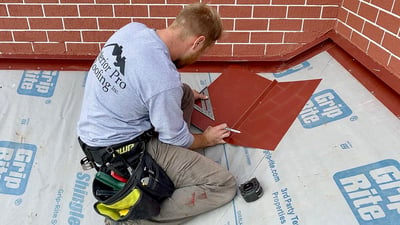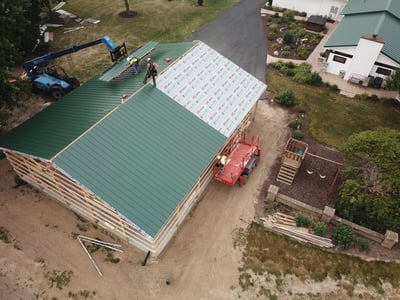Installation Insights: What to Expect During Roof Replacement
Roof replacement is a big job. Even if you’ve never been through this kind of project and you have no idea how roofing works, you probably already know this.
However, if you’ve been putting off or dreading replacing your roof because you know there’s a lot that goes into it, you’re in the right place. Knowledge is always power, and once you understand more about the roof replacement process, you’ll be better equipped to plan your project and install your new roof.
Contractor Selection

The first thing you need to know about a roof replacement project is that contractor selection will greatly impact how your project goes.
Professional roofing companies have experience tackling roof replacement projects, own the tools and equipment needed to make the job quick and painless, and bring good relationships with material suppliers. All of those things can make roofing projects go faster, smoother, and with fewer delays and surprises.
When you’re selecting a roofing company for your roof replacement project, try not to focus only on the price at the bottom of their quote. Asking the right questions can help you narrow your selection down to the best options. Those questions should include:
- Are they licensed to work in your area and have insurance? If your contractor does not have the right kind of insurance, you could be legally liable for injuries or damage related to your project.
- What kind of warranty do they offer? You can often ask to see a generic version of this document, and be sure to ask if their warranty is prorated or not – this could affect how much repair or remedial work is covered under the warranty.
- How many work crews do they have, and what kind of equipment do they use for their projects? Larger roofing companies will have more than one crew and use time and labor-saving equipment to complete your project faster. This reduces the likelihood of delays in your project and makes a faster installation more likely.
- How long have they been in business? While it’s not always the case, and some great roofing companies are just starting in the marketplace, you can never tell which new company will be around in five or ten years when you might need to contact them about your warranty. The longer a roofing company has been in business, the more likely they are to stay in business.
- Finally, always ask for references and contact them. You want to talk to people who have dealt with the companies you’re considering. While you’re at it, be sure to read their online reviews so you can find out what everyone else is saying about them.
The more information you can gather on the companies you’re considering for your roof replacement project, the better equipped you will be to choose the right one. So, take your time and ask as many questions as you think are necessary.
The Installation Process

Roof replacement involves many steps between accepting the quote and finishing the job. Most replacement roof projects follow the same basic process, including things like:
- A site visit to inspect your roof before the quote is prepared to ensure that the roofing company knows what they’re dealing with and how much work your project will be.
- Roofing quotes often include a variety of materials and color options, so you’ll need to select the option you want for your home.
- Once you’ve signed the contract, accepted the quote, and usually paid a deposit, your roofing company should give you an estimated start date.
- During what is known as the “pre-construction” phase of your roofing project, your roofing company will apply for any necessary permits and get all the paperwork in place for your project.
- Your roofing company might arrange for materials to be delivered to your property. This cuts costs on shipping, so as long as you have the room to store it, it’s good news!
- Once your materials have arrived, your roofing company will usually contact you again to confirm their planned start date. They’ll need to ensure that they have the resources necessary to get the job done and that other factors, like the weather, are favorable for the completion of your roof replacement.
- If your roof replacement requires demolition, demolition crews and waste bins usually arrive on-site at the same time. This allows your old roof to be removed, placed in waste bins, and taken off-site most efficiently. Most roofs can be stripped of old roofing materials within a few days, but the type of roofing and complexity of the roof can affect the timeline for demolition. Some roof replacement projects will not require demolition because the new roof material can be installed over your existing roof. This saves time and money, so always ask if it’s an option!
- Your roofing company will probably inspect the roof after the roofing material is removed and before they start installing new material to ensure there is no underlying damage that needs to be addressed.
- If any repairs need to be made at this stage, and they weren’t included in the first quote you received, you might get a change order or a second quote at this point. You’ll need to approve that quote or change the order before work can continue.
- Once your roofing company is ready to start the roof installation, they’ll usually start work in a specific part of the roof. Some roofing systems go on from side to side, while others go up or down from the bottom or top of the roof. Sometimes, there will be areas that might not be done during the main installation if there are complicated cuts to be made or if that area needs some extra attention.
- Once the roofing material is installed, there’s still work to be done, and this usually includes installing flashings, fitting gutters, and other finishing work that needs to be done to ensure your roof is watertight and properly finished.
- Most good roofing companies will show you your new roof (sometimes with a drone if you’d rather not climb a ladder!) to ensure you’re happy with the project before they clean up and leave your job site. They might also ask you to sign completion paperwork that confirms that you’re satisfied with the work and that the job has been completed. Don’t be afraid of this kind of paperwork! It’s a great way to ensure that everything is completed correctly and above board. But do ask for a copy of the paperwork along with your warranty documentation. And, of course, never sign anything that you don't understand! When in doubt, share the paperwork with your attorney for review prior to signing.
- Once your roof replacement project is completed, the balance on the contract will be due. Most residential roofing companies don’t offer payment terms, so their invoices are usually due on receipt.
The time required to get from steps 1 to 11 on this list will vary based on the size of your roof, contractor backlog, the type of roofing material being used for your roof replacement, and whether there are any unexpected changes once the work gets underway. But most replacement roof projects will take a week or two from the time that your contractor arrives on site.
You can always ask your roof replacement company for an estimated schedule for your project if you want a more accurate idea of how long the job will take. Most will be happy to give you an estimate of how long they think your project will take.
Common Installation Challenges and How They Are Addressed

Several challenges could affect your roof installation. Some of the more common issues you might discover during your project include bad weather, hidden damage to the roof structure, safety issues when installing roofing, waterproofing challenges, permit and regulatory challenges, and supply chain issues.
There are several ways good roofing companies mitigate these challenges and address them when they come up.
- Your roofing company will pay close attention to weather forecasts and plan your roof replacement to coincide with the best possible conditions.
- A good roofing company will have a process in place to ensure all permit and regulatory requirements are taken care of before they arrive on-site to get the job done.
- They’ll do a site visit and inspect your roof before they quote the job, and they’ll take note of any possible structural or roof-related issues, so they’ll arrive on-site ready to tackle any underlying problems
- Good roofing companies have health and safety plans in place for working at elevated heights, and they’ll be using appropriate personal protective equipment, including harnesses and fall protection
- They’ll also have all the necessary workmen’s compensation insurance for their crews and public liability insurance to protect everyone else
- Professional roof companies plan projects carefully to ensure that all the materials for the job arrive before they start work, that there are waste bins on site for demolition, and that everything is done in the correct sequence
- Finally, a good roofing company will double-check flashings, waterproofing, and other common problem areas before they leave, so when they do, you’ve got a roof that will get the job done right
In most cases, hiring the right professional roofing company to do your roof replacement will help to ensure that any issues that do come up during the installation process are taken care of quickly and with as little additional cost or delays as possible.
Aftercare: Post-Installation Checks and Immediate Maintenance
After your roof replacement is done, you'll want to take care of a few immediate checks and maintenance tasks as soon as possible.
First, ask your roofing company to check your yard for any leftover pieces of metal, nails, clips, and other debris. Many will use magnets to pick up any leftover metal, and this is a very important step because these leftovers can be dangerous for people, pets, and property.
If you have had a metal roof installed, ensure that the contractor who installed it has cleaned all loose metal shavings that might be left on the surface from cutting. If they are left on your roof, they can rust and accelerate wear on your roof.
Have your roofing company double-check that all vents, gutters, and other rooftop equipment that might have been moved or removed to complete the work are replaced and reconnected.
Finally, pay close attention to your roof the first time it rains after you’ve had it replaced. If there are any areas where the roof is not properly installed or sealed, you’ll be able to spot leaks fairly quickly, and you will need to call the roofing company and ask them to repair or redo the work in that area.
About McElroy Metal
Since 1963, McElroy Metal has served the construction industry with quality products and excellent customer service. The employee-owned components manufacturer is headquartered in Bossier City, La., and has 14 manufacturing facilities across the United States. Quality, service and performance have been the cornerstone of McElroy Metal’s business philosophy and have contributed to the success of the company through the years. As a preferred service provider, these values will continue to be at the forefront of McElroy Metal’s model along with a strong focus on the customer.









Comments on this article:
Scroll down to the bottom to submit a comment and join the conversation. Need help or have a question? Please contact us. Looking for a distributor or contractor? Please click here to get started.